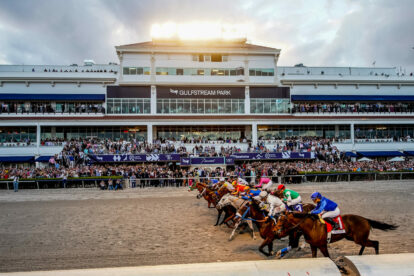Florida’s sports betting scene gained a lot of attention when the Seminole Tribe secured exclusive online betting rights in 2021. This agreement, which overcame legal challenges, completely changed the landscape of gambling in Florida. It stands in stark contrast to traditional horse race betting, a key part of Florida sports betting history. Florida-based horse racing fans have access to plenty of sportsbooks covering horse racing and offering lucrative bonuses.
On March 17, 2025, the Florida House Commerce Committee passed HB 105, a bill that separates live horse racing from casino and cardroom licenses.
Full Card Plays Available Now
There’s a reason we’re the #1 trusted source for premium racing picks & info.
This highlights a major shift in the state’s gambling priorities and raises questions about the future of horse racing as the state focuses more on sports betting and gaming profits. This reflects a struggle between maintaining Florida’s rich horse racing history and moving towards a lucrative new gambling era. Republican Representative Adam Anderson introduced HB 105, and it quickly passed after about two hours of debate, moving to the full House for a vote. The bill impacts Florida’s two remaining Thoroughbred racetracks, Gulfstream Park and Tampa Bay Downs. It removes the requirement for them to hold live races to keep their gaming licenses, which include slot machines, card rooms, and casinos.
This decision worries many racing enthusiasts as they fear it could damage an industry that provides many jobs and significantly benefits Florida’s economy. Lonny Powell, CEO of the Florida Thoroughbred Breeders’ and Owners’ Association, vocally opposed the bill. He argued that HB 105 is harmful to the Thoroughbred industry, a vital part of Florida’s identity. Powell explained that having fewer races could lead to job losses and push horses and revenue to other states or even to places like Toronto.
Florida’s horse racing sector supports over 33,000 jobs and contributes $3.2 billion annually, so the potential impact is substantial. Powell painted a dire picture of the consequences for rural communities if horse racing declines. Trainer Mark Casse echoed these concerns, accusing Gulfstream Park’s operator of valuing gaming over horse racing. He warned that the bill might hurt Florida’s Thoroughbred racing, noting how important the state’s horse breeding and training industry is globally. With over 3,000 Thoroughbreds wintering in South Florida, losing Gulfstream as a racing venue could force trainers to relocate, disturbing the entire ecosystem of jockeys, breeders, and farm workers.
Supporters of HB 105, led by Anderson, argue that the bill includes measures to protect racing. It requires that tracks continue live racing until 2030 and mandates a three-year notice before any closure, with notices disallowed until July 1, 2027. Anderson described this as a win-win situation that ensures racing for another five years while allowing tracks to concentrate on more profitable gaming. He suggests that horse breeding could prosper independently without relying on casino income. Still, skeptics like Powell and Casse view these measures as temporary fixes, believing that racing depends on gaming revenue for survival. The bill’s path forward remains uncertain.
The Florida legislative session lasts until May 2, 2025, and HB 105 will undergo further examination by the full House and potentially receive more support in the Senate. Lawmakers must decide between the economic influence of casinos and preserving the cherished culture of horse racing. For now, the horse racing industry waits in anticipation, caught between traditional betting and a future that is leaning towards sports betting and slots. This development is key to Florida’s evolving sports betting landscape, showcasing a state at a pivotal moment.
As the Seminole Tribe’s betting operations expand, traditional gambling practices like horse racing face the risk of being overshadowed. HB 105 exemplifies a broader trend where financial interests may outweigh heritage, reshaping Florida’s reputation as a hub for gambling and sports. The fate of horse racing will reveal how Florida balances its historical roots with new financial opportunities.


